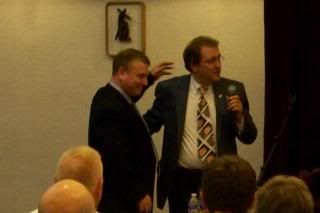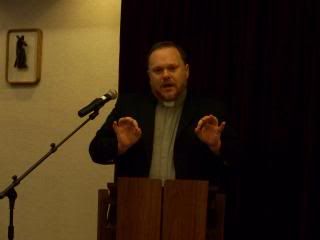Sunday, September 29, 2013
Friday, September 27, 2013
Rochester Chesterton Conference: The Morning
As is typical of Rochester Chesterton Conferences, there's so much to a talk about after this year's gathering - talks, books, conversations, jokes, being around fellow Chestertonians, and more. The 2013 edition - the 10th - focused on "Points of Light: Literary Voices Against the Darkness". For me, the highlights were the morning talks about JRR Tolkien, Ronald Knox, and Hugh Benson.
The day began with Lou Horvath providing an introduction to the day, then his lovely wife providing a humorous introduction to the first speaker - Joseph Pearce, author of too many books to count, who discussed Tolkien, with a focus on The Hobbit. I read that book years ago, before I read The Lord of the Rings, and, to be honest, after reading the trilogy I relegated it to the children's literature shelf. Foolish me.
Joseph Pearce and Dale Ahlquist
Pearce pointed out the complexities of the story that got me thinking. The journey of Bilbo, as he notes, is one of "sin to virtue" that parallels the journey we must all undergo. He also addressed the subject of "luck" in the book, noting that what seems to be luck for the hero is linked t the vice of the opponent. The opponent's vices - Gollum's especially, but also Smaug's - lead them to make poor choices that allow the hero to win. Think of the riddle game where each time Gollum is on the verge of winning his vices lead hints that help Bilbo to solve each puzzler.
There was more, but basically Pearce inspired me to dig out my copy of The Hobbit and to add it to the pile of books I need to read/read again.
By the way, the consensus among the speakers was that the recent film, The Hobbit, did not do justice to the book, and does not measure up to The Lord of the Rings trilogy. I agree.
Pearce was followed by Deacon Nathan Allen who discussed Knox and Benson. The Deacon was an entertaining speaker, but what made his talk stand out for me was that while I had heard the names of both of his subjects, I knew nothing about them. It was fascinating learning the stories of these two converts and the suggestions about which of their works to read. I liked his comments that "you will know Chesterton better when you know the people he read." I own none of their books; I'll be on the lookout now.
There's more delightful from the day, but these morning talks stood our for me.
Pax et bonum
Saturday, September 21, 2013
Chesterton Conference
"So, where is the report about the 2013 Rochester Chesterton Conference?"
(More to come!)
Pax et bonum
Rochester Chesterton Conference Today
Off to the Rochester Chesterton Conference.
Chesterton - JRR Tolkien - Benson - Knox - Dickens - Solzhenitsyn - Ahhh.
Report later.
Pax et bonum
Thursday, September 12, 2013
What about those miracles?
I don't doubt that there are miracles. Not only are they part of church teachings, but history is full of them. Take something like the Stigmata. That people have manifested the wounds of Christ is documents. There are multiple witnesses. There are pictures. There have been many stories of healings that defy normal explanation.
But what about those other miracles - the ones that seem almost legendary?
I think some of them are legendary, part of the treasury of hagiography attached to certain saints.
For example, there is a story of St. Nicholas who somehow grabbed an enslaved child by the hair and flew/teleported him to outside the church to be reunited with his parents. Much as I admire St. Nicholas, that one seems a bit far-fetched!
My questions isn't about the miracles per se. It's about who believed the more legendary-sounding ones.
How did the great Doctors of the Church regard some of the legend-like stories? Did they believe them? Did they suspect they were not true but kept quiet so as not to harm the faith of those who do believe them?
I suspect some of them did discredit such tales, but I don't have a document from one of them in front of me.
There are certain things I'm not big on. Devotions, novenas, the old Latin Mass. I don't mock them or in any way try to belittle those for whom such things are important. If such things help them to grow spiritually, to worship God, to find peace, then God bless them!
Perhaps that's the stance that those wiser and holier than I have taken.
Pax et bonum
Saturday, September 7, 2013
Pray for peace - and life
Since last I wrote, school has started, and my laptop came out of the repair shop - and went right back in for the same problem.
I'm writing this on wheezer, our old desktop computer. It's making noises at me right now.
Today men's group began - followed by Mass. At Mass, the homily focused on the Pope's call for prayer for peace in Syria and around the world. We also said a prayer for peace.
I then went to a perpetual adoration chapel to say a Rosary for peace and life. I say that not to brag, but to point out that there are people like me in my region and across the world praying today. I salute them - and thank the Pope for making this call.
I just wish our government would listen.
Pax et bonum
Subscribe to:
Comments (Atom)



